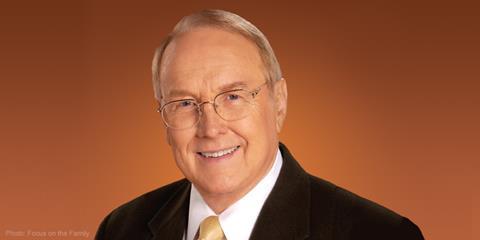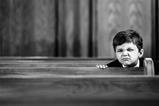The leading figure in the American Religious Right who died in August wielded enormous influence among Christian conservatives through both his teaching on parenting and his political advocacy. Tim Wyatt looks at the life and legacy of Dr James Dobson

James Dobson, a titanic figure in the American Religious Right whose teachings on families and parenting shaped a generation of evangelicals, has died aged 89.
After making his name in the 1970s with his parenting advice, Dobson gradually shifted into more overt political advocacy in later decades, becoming one of the leading evangelicals seeking to reform the Republican Party in Jesus’s image.
Through his Focus on the Family charity and lobby group the Family Research Council, Dobson wielded enormous influence among Christian conservatives in the United States. Under his watch, family values became a core part of the evangelical agenda. At all times he sought to roll back the revolution of the 1960s, strongly opposing abortion, divorce, feminism, same-sex marriage and more.
Dobson was born in Louisiana in the 1930s during the Great Depression to a travelling evangelical preacher. After moving around several times, and for seasons being left with family members while his parents hit the tent revival trail, by his own account he began to act out and rebel.
He praised his parents’ firmness in abandoning their travels to focus on returning their wayward son to the righteous path, and after graduating from college trained as a child psychologist. He was successful, spending more than a decade practising and teaching in California, but he hit the mainstream only when his first book was published in 1970.
Entitled Dare to Discipline, the book pushed back at the new wave of permissive, gentler parenting advice promoted since the second world war. Rather than seeking to get in touch with your child’s emotions, parents must reassert their control, Dobson insisted. Controversially, he was a proud proponent of smacking, including with a paddle or belt which could be left in a child’s eyeline as an implicit warning. Smacking should never be done out of anger or with a desire to inflict pain but was a vital tool in establishing good boundaries for a child, he wrote.
Later that decade, Dobson turned his newfound fame as a dispenser of evangelical parenting advice into first a radio show and later the charity Focus on the Family.
Focus on the Family grew rapidly and so did Dobson’s influence in the 1980s and 1990s. Soon the organisation was turning over hundreds of millions of dollars a year and employed more than 1,300 people (many of them replying to the thousands of letters and phone calls which poured into their Colorado headquarters asking for advice). And Dobson began to expand from simply pushing back against softer parenting styles. He railed against the other bitter fruit, as he saw it, of the 1960s permissive revolution, in particular abortion, gay relationships and egalitarian gender roles.
Unashamedly political
Along with fellow Religious Right leaders such as Jerry Falwell and Pat Robertson, Dobson became influential in conservative politics and helped pull the Republican Party over towards his socially conservative evangelical vision. He advised numerous presidents from Ronald Reagan onwards, and founded the Family Research Council as a more explicitly political lobby group. Through it he harangued candidates who offered even a hint of accommodation to the pro-choice or gay rights movements.
Dobson churned out books by the dozen and at its peak his weekly radio broadcasts claimed seven million listeners. He built out a network of like-minded family values lobby groups across dozens of states to influence local government while he trained his guns on Washington politics. He even mused about making his own run for president in 2000, before ultimately deciding against it and coming out in favour of George W Bush.
In his latter years, he was a fully paid-up member of the MAGA movement, endorsing Donald Trump in 2016, 2020 and 2024. He would at times appear at campaign rallies, offering opening prayers and was effusive in his praise for Trump’s Supreme Court appointments, which paved the way for the ending of Roe vs Wade in 2022.
He had no time for evangelicals who avoided contentious political issues. No, all faithful Christians had a duty to seek to turn back the tide of sin which he saw sweeping across his nation. “Do we as Christians need to be liked so badly,” he once said, “that we choose to remain silent in response to the killing of babies, the spreading of homosexual propaganda to our children, the distribution of condoms and immoral advice to our teenagers, and the undermining of marriage as an institution? Would Jesus have ignored these wicked activities?”
A hero to many
Dobson was held up as an evangelical hero by many, including Franklin Graham who posted online after his death that his friend’s “legacy for Jesus Christ” would last for generations. “Dr Dobson was a staunch defender of the family and stood for morality and Biblical values as much as any person in our country’s history,” Graham wrote.
The influential evangelical theologian and writer Albert Mohler (who used to sit on the board of Focus on the Family) praised Dobson on his podcast for making a difference in politics, and helping to “awaken evangelicals to a political responsibility”. But he was also a genuinely kind person, Mohler said, who paid special attention to building relationships with his own children during a visit to their home. “He was one of the most influential voices in defence of the family and of Christian faithfulness in his time. And he was also a very real human being I’m glad to have known as a friend,” Mohler concluded.
The ADF, a conservative Christian legal activist group which Dobson helped found, also mourned his loss. Their chief executive Kristen Waggoner said that the “world has lost a mighty voice for truth and an incredibly influential servant of Christ” and went on to pay tribute to Dobson’s “bold leadership and commitment to the Gospel” which had shaped so many lives.
Closer to home, Andrea Williams, the head of Christian Concern, said Dobson steadfastly brought “Biblical wisdom” to homes and families in America and far beyond. He pointed consistently to “marriage, parenthood, and the raising of children in the fear of the Lord as the very heart of a healthy, strong and civilised society and at the root of mature Christian discipleship”, she wrote. “We at Christian Concern give thanks for his witness and pray that many will rise up to follow in his footsteps, unashamed of the gospel, unyielding in truth, and unwavering in love.”
A contentious figure
But Dobson’s legacy among evangelicals is complicated. For every person who sees him as a bulwark against liberal moral drift, there are those who criticise his trenchant political activism and aggressive denunciation of those outside the church. While warm and mild-mannered in style, Dobson nevertheless cemented the public perception of American evangelicalism as condemnatory and censorious.
Some of those raised in families which hewed to his firm disciplinarian approach have attacked Dobson’s parenting advice as abusive, especially his focus on corporal punishment and on children as strong-willed mini-sinners whose rebellious spirits required breaking. Others say that his movement was as much gripped by a desire to return to the deferential traditionalism of the 1950s as it was any particularly biblical vision of family life.
He was also a strident proponent of much-contested conversion therapy, supporting various organisations which sought to change gay Christians’ sexual orientation. He wrote in several books about the importance of fathers modelling strong masculinity to their sons (and even breaking off bonds with their mothers) which would prevent them growing up to be gay. He was also unpopular in egalitarian circles for arguing in favour of more traditional gender roles, with the husband out hunting, working or fishing while wives focused on their natural inclination towards being homemakers.
He was at times mocked for his clumsy interventions in popular culture, most notably in 2005 when he fulminated against the popular if kooky kids cartoon Spongebob Squarepants, attacking it as pro-homosexual propaganda for children. He denounced the Harry Potter books for promoting witchcraft, while describing the Dan Brown thriller The Da Vinci Code as “cooked up in the fires of hell”.
He was also criticised in 1989 for recording a video interview with the notorious serial killer Ted Bundy just hours before he was executed. In the video Bundy claimed watching pornography had precipitated his brutal murders, and Dobson later earned more than $1m distributing the interview as part of a crusade against porn.
As his movement and activism became ever more political, he was also accused of partisan hypocrisy. He led condemnation of Bill Clinton in the 1990s after his affair with Monica Lewinsky was exposed, declaring that a man who could not be faithful to his wife could not be “trusted to lead the free world”. However, he was steadfast in his support for thrice-married Trump, even after he was accused by multiple women of assault and exposed on a secret tape of boasting about grabbing women’s genitals. Yes, Trump was not a perfect person, Dobson airily said, but we were electing a commander-in-chief not a pastor, and after all he did help appoint anti-abortion judges to the Supreme Court.
He also railed against PEPFAR, a Bush-era government programme which spent billions of dollars tackling HIV and AIDS overseas (and is estimated to have saved 25 million lives), on the grounds it was funding condoms and other “immoral” practices. Later, after Dobson had also falsely claimed PEPFAR funded abortions and refused to give money to faith-based groups, it emerged Focus on the Family had received a grant from PEPFAR to run an abstinence pledge initiative.
Family first
His ultimate legacy for Christians will always be mixed. Many will struggle to celebrate his faithfulness to the gospel and willingness to speak up for its social implications because of how deeply politicised Dobson’s movement became. Others lament his outsized influence on evangelical parenting culture and the way he cemented an authoritarian approach to discipline as the only acceptable way for Christians to raise their children.
But alongside the detractors there will also be many who give thanks for his long ministry. Unlike numerous other televangelists and evangelical leaders of his generation, Dobson lived modestly. He took no salary from Focus on the Family, even as it grew into a parachurch behemoth, instead living off his book royalties, and remained devoted to his wife of more than 60 years until his death.
He self-evidently was entirely committed to what he saw as his calling to try and turn America back from the cultural dead-end of the 1960s permissive revolution. For all the debate over his methods and message, there are many who are grateful for how he urged Christian parents and the wider nation to take family life more seriously.
John Fea, a history professor at the evangelical Messiah College in Pennsylvania, wrote last year about his own experience growing up in a Dobson-inflected home. He recalled how his hard-charging ex-Marine father abandoned his abusive, aggressive ways after becoming a Christian and beginning to listen to Dobson’s weekly broadcasts.
“Even as a self-identified evangelical Christian that I am, I have no use in my own life for Dobson’s politics or his child-rearing,” he said. “But as a historian what do you do with these stories? About a dad who becomes a better dad?”






































No comments yet